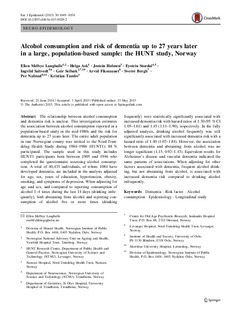| dc.description.abstract | The relationship between alcohol consumption and dementia risk is unclear. This investigation estimates the association between alcohol consumption reported in a population-based study in the mid-1980s and the risk for dementia up to 27 years later. The entire adult population in one Norwegian county was invited to the Nord-Trøndelag Health Study during 1984–1986 (HUNT1): 88 % participated. The sample used in this study includes HUNT1 participants born between 1905 and 1946 who completed the questionnaire assessing alcohol consumption. A total of 40,435 individuals, of whom 1084 have developed dementia, are included in the analysis adjusted for age, sex, years of education, hypertension, obesity, smoking, and symptoms of depression. When adjusting for age and sex, and compared to reporting consumption of alcohol 1–4 times during the last 14 days (drinking infrequently), both abstaining from alcohol and reporting consumption of alcohol five or more times (drinking frequently) were statistically significantly associated with increased dementia risk with hazard ratios of 1.30 (95 % CI 1.05–1.61) and 1.45 (1.11–1.90), respectively. In the fully adjusted analysis, drinking alcohol frequently was still significantly associated with increased dementia risk with a hazard ratio of 1.40 (1.07–1.84). However, the association between dementia and abstaining from alcohol was no longer significant (1.15, 0.92–1.43). Equivalent results for Alzheimer’s disease and vascular dementia indicated the same patterns of associations. When adjusting for other factors associated with dementia, frequent alcohol drinking, but not abstaining from alcohol, is associated with increased dementia risk compared to drinking alcohol infrequently. | |
